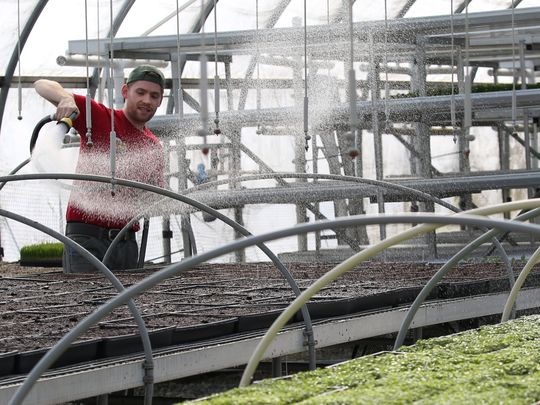By: Brian Sharp, @SharpRoc
His father handed him the books to the family farm right out of high school, and Doug Mason has been making the business decisions ever since.
He was 18 then. He is 54 now, the seventh generation to operate Mason Farms in Williamson, Wayne County. His family's produce was on the first Wegmans pushcart, peddled on the streets of Rochester a century ago. His dad farmed about 250 acres. He farms about 900. And more than half of that is now dedicated to one customer: Wegmans Food Markets.
"Going into next year, the acreage for Wegmans is going to be a lot more," Mason said. "We are growing with what they want us to raise. ... We are going to be expanding a lot for them in organic production."
Wegmans is more than brick-and-mortar grocery stores, more than a Fortune 500 enterprise with $7.9 billion in annual sales and some 45,000 employees across New York and five other states. The Gates-based retailer — rated the No. 1 grocery store in America by Consumer Reports — is "a gamechanger," said Susan Brown, associate dean of the Cornell University College of Agriculture and Life Sciences and director of New York State Agricultural Experiment Station.
And the changes are coming more rapidly, of late, with Wegmans driving an expansive network that one supplier envisioned could transform the region into "the Silicon Valley of food."

"There are so many examples of what Wegmans is doing, and how they are connecting all these different companies in the region and finding ways to work together," said Frank Cavallaro, vice president of research and development for LiDestri Foods. "This is a movement that has been just crazy in the last year or two. Their effort has been to find opportunities."
Linking suppliers, researchers and producers might seem a no-brainer, or something that should already exist by necessity. But those connections in the past have been disjointed, more patchwork than order, and certainly not creating the buzz of economic potential now extending across the region's agriculture industry, which spans 1.5 million acres of farmland and employs some 15,000 people.
The company actively pursues new technologies and techniques, not just in the store but on the farm, invests money and staff time in testing new crop varieties, explores ways to extend both the growing season and shelf life of foods while also making those foods healthier. Wegmans has started its own farm, restaurants and other ventures to grow its expertise, and sought help in reducing its carbon footprint — then shared those lessons with the industry.
The Wegman Family Charitable Foundation helped fund a new School of Health and Nutrition at Rochester Institute of Technology. Hillside Work-Scholarship Connection, a drop-out prevention and job readiness program, was started and continues to be supported by Wegmans.
Danny Wegman, 69, the company's CEO, serves as co-chairman of the Finger Lakes Regional Economic Development Council, which recently secured $500 million for the region. Colleen Wegman, 44, his daughter and the company president, is chairwoman of the United Way of Greater Rochester.
The breadth and depth of Wegmans' involvement in the industry and community is unmatched, officials say. As is their willingness to expend their own money, manpower and time.
"I feel a lot of farms in this area wouldn't be in business anymore if it wasn't for the Wegman family," Mason said, referring to competition from big corporate farms in California. "They stuck with the family farms."
Growing farms
Matt Slegle farms 1,400 acres of crops and raises 1,400 head of cattle at Conquest Cattle Feeders in Cato, Cayuga County. Conquest has been a partner with Wegmans and Colorado-based Myers Natural Beef going on three years now, shifting its focus from convention to natural beef, raised without growth hormones or antibiotics.
"Since we started with them, we've grown probably 500 head more," Slegle said. "This year itself, we are going to put on another 200 head."
Conquest is part of a regional network of ranchers, in New York, Virginia and Pennsylvania, all raising natural beef, that Wegmans assembled over the past four or five years.
Influence
Danny Wegman draws no particular notice of his familiarity. He wears the standard-issue Wegmans employee name tag when he goes to work. He has since he started with the family business as a teenager. Same with his daughters.
Those who know and work with him describe him as sincere and focused, curious, yet personable. He is known for demanding one-page memos summarizing sometimes expansive and complex topics. He also is known for his sometimes garish sport coats.
Though sophisticated in their use of data, the Wegmans also are regulars in their stores, chatting up customers and employees, with Danny Wegman sending himself countless notes on his cellphone. He is convinced the region, from Buffalo to Syracuse and into the Southern Tier, is poised for "huge growth in food production" — to serve not just this area but to be exported to other parts of the country.
He is not the most polished public speaker. He once called Gov. Andrew Cuomo by Cuomo's father's first name, "Mario," during an introduction. He joked it off, displaying an ease and affability, and remains on good terms with the governor. In fact, there is "nobody in this state who won't take Danny Wegman's call," said Robert Duffy, the state's former lieutenant governor under Cuomo.
Duffy is Rochester's former police chief and mayor and current president/CEO of its Chamber of Commerce, a job he sought Wegman's insight on before taking.
"I routinely will call Danny Wegman for advice. I will seek his counsel and thoughts on issues," Duffy said. "What I appreciate about Danny is sometimes people will talk and talk incessantly. Danny Wegman will say five words and nail it."
It was a phone call Danny Wegman made a a year and a half ago to Giovanni LiDestri that set in motion an effort some say is transforming the region's food production industry.
LiDestri's Cavallero credits Wegmans and Cornell, another partner, with putting together the atypical set up that has LiDestri housing the equipment that is more geared toward improving the processing of others' products, allowing those producers to reduce sugar and salt and remove preservatives. LiDestri and others meet weekly at Wegmans, looking at what products to pursue. The grocer has introduced LiDestri to close to 100 suppliers, so far.
"In a nutshell, it really opened the door," he said. "It has allowed us to start to work with all these different companies that have been around us all these years that we would never have talked to."
And those connections have led to other connections. All this requires investment, which Wegmans is willing to make, Cavallero said. As for the others? "Wegmans demands it," he said, but in an unstated way. "(The others) follow. They know that Wegmans is the leader, and they are going to set the trend."
Wegman calls the blossoming collaborations "astounding," and marvels at the potential: "It's growth that, five years ago, we would have never suspected."
It's not just the ecosystem, with its bountiful water, but the players who have Wegman so charged: Cornell is one of the pre-eminent food education schools in the country, if not the world, he said. RIT is working on sustainable packaging and production. LiDestri's role continues to expand. The list goes on.
Cuomo has spoken about it. But it's not just here. Every regional economic development council had an ag component in their plans this past year, said Steve Ammerman, spokesman for the New York Farm Bureau. It was out of that effort that the Finger Lakes Food Initiative was born, a collaborative assembled by Wegman that meets regularly to discuss and share new initiatives and best practices.
Connecting the dots
The outlook wasn’t always so bright.
The 1980s and early 1990s saw a marked decline in the number of family farms across New York. The decline has slowed, even rebounded in areas of the Finger Lakes and elsewhere, according to the USDA Census of Agriculture. Monroe County has seen a continued drop, however, leaving it with the least farmland and fewest total farms in the nine-county area.
Fred Palmer sold his family's farm in Williamson back in 1986. They used to supply Wegmans, and his dad knew Bob Wegman personally. As Wegmans grew, however, they decided to stay small. Since 1988, Palmer has been produce manager at Hegedorn's Market, a Webster grocer with a similarly devout customer base, that has been around for 60 years.
The Ridge Road store is flanked by Wegmans a short distance to the east and west. Some growers, they share. But Hegedorn's mostly deals with those small farmers, Palmer said, the ones more geared toward farmers markets than supermarkets. And while Hegedorn's sees little benefit from Wegmans, beyond the traffic they draw, there is nonetheless respect of a competitor.
"I don't feel that they limit us in any way," said Hegedorn's Market operations manager Noreen Roesser. "They're a class act."
That Wegmans is so involved should come as no surprise, really.
Wegmans is in the restaurant business, with Next Door. The Burger Bar. Amore Italian Restaurant & Wine Bar. Why? To better understand not just food sourcing but preparation and retailing, Danny Wegman said, and then to bring that knowledge back into the stores with prepared meals, recipes and service.
Wegmans built its own cheese caves — because ripening of cheese is important, and the best way to understand it was to do it. Same with the organic research farm, which supplies some store produce but also serves as a lab, researching different growing techniques, taking the risks so farmers don't have to. One idea on how to extend the growing season involves the use of tunnels or "hoops." Mason has such tunnels spread out on three acres and began planting seeds this past month.
What is happening of late — by linking growers with one another and growers with researchers, with Wegmans actively in the middle — is creating a hub, said Mike Kreher of Kreher's Farm Fresh Eggs, "sort of like the Silicon Valley of Food.”
"It's kind of connecting dots," said Andy Harlan, assistant director of operations at RIT's Center for Integrated Manufacturing Studies and the Golisano Institute for Sustainability.
Harlan is talking about the Finger Lakes Food Processing Cluster Initiative, a "farm to fork" economic development collaborative, spearheaded by RIT, that aims to bolster food production in the region.
Working with the initiative, Wegmans has helped develop a chef training program for veterans, hired a couple of the graduates, worked with Harlan and RIT on that project to reduce their carbon footprint. All that grew into an interest in how to more efficiently de-package packaged food and divert it from landfills. And they are exploring automated or semi-automated harvesting for organic, leafy green vegetables.
"There is a lot of potential for growth here if you can mechanize," Mason said. "There's a lot of opportunities."
Mason Farms runs its organic business under the name Old Ridge Farms, with 300 certified acres and a sizable amount of land in transition. The continued expansion notably includes sweet corn, which Mason said they will start husking as well, at Wegmans request.
"We sit down on an annual basis with them, seeing what their needs are," Mason said. "It's kind of funny. It has taken a circle, because I am going back to crops my grandfather used to raise (organic leafy greens) but my father got out of because there was no money."
Wegmans likes to say they are a family company and a company of families. Each connection is a thread, some extending for generations, others less, and lately more threads connecting old and new.
"What's happening is like this web," Danny Wegman said, "that you would never know about."
BDSHARP@Gannett.com


